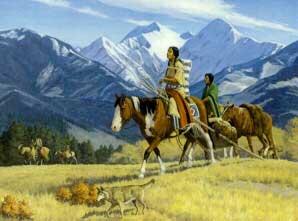|
Song
Dog Kennels
|
 |
|
Home
of SONG DOG KENNELS -- Sole copyrighted Registry for the AMERICAN
INDIAN DOGS
|

Plains
Indian Dogs
These were the most common of all the Native
American Dogs and were also found outside the Plains areas. The Hare Indian
Dogs, Common Indian Dogs, or all the medium sized types from all the Native
American groups from Alaska to the tip of South America were all very
similar. These medium sized (coyote type) dogs were used chiefly by the
Indians as beasts of burden or to drag travois for transporting food,
wood, clothing, and household goods. They were also for hunting bear,
running down deer, and corralling bison. They served as watchdogs, bed
warmers, and baby sitters, even for food for symbolic or ritual purposes
during times of famine. They were medium sized, about 50 cm at the shoulders;
large, erect ears; tail was medium sized and bushy, held drooping or slightly
curved. Their coat was rather rough, usually pale yellow, brownish yellow,
or a lead gray mixed with lighter or white-ish sable. Their coyote shaped
skull with a typical occipitonasal length of 170 mm, typical zygomatic
and a width of 105 mm; and with a slender frame.
The earliest reference to the Plains Indian Dog is given by Coronado,
written after the 1540 tour of exploration of the Southwest. Francisco
Coronado set out from Compostela, Mexico, with 300 Spaniards about a thousand
Indians, entered the region of Arizona and New Mexico. He led his men
through eastern Texas, northeast across what is now Oklahoma and Kansas.
Although looking for treasure, he found only the Wichita Kansas Indians,
the bison, and the Plains Indian Dog. It is even recorded that Coronado
followed the Indian practice and employed “dog-packing” in his travels.
So important was this use of the domesticated canine that in the thousands
of years prior, even after the arrival of the horse, the welfare and survival
of every Plains Indian family depended almost entirely upon their having
a large number of dogs. Fortunately, a great deal is known about the Plains
Indian Dogs. During the period from 1750 to 1900, numerous artists, naturalists,
and anthropologists visited the tribes of the region west of the Mississippi
and Missouri Rivers. Their records contain a great amount of information
about the Plains and Sioux Dogs that were common to these cultural groups.
The artists Catlin, Bodmer, Kane and Rinisbacher provided valuable pictorial
evidence of their use and what they looked like. The work of Gilbert L.
Wilson and Frank Roe also provide a wealth of factual information about
these dogs, as they lived with the Hidatsa’s for 10 summers. All this
research and more, has given us a very clear and complete picture of the
American Indian Dogs.
Kim La Flamme

Song Dog Kennels
3600 LAKESHORE DRIVE
SELMA, OREGON 97538
(541) 597-2871
EMAIL
